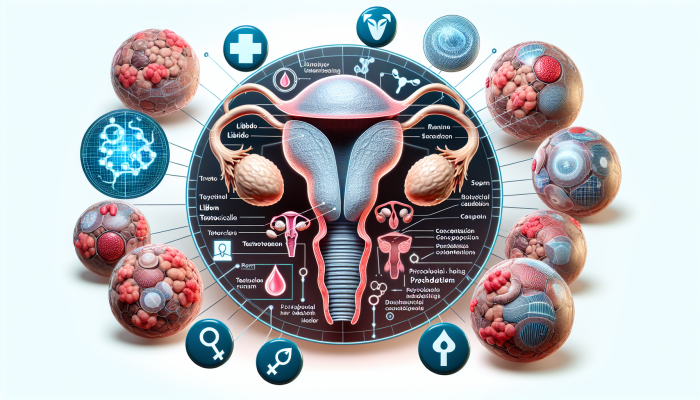In-Depth Exploration of Testosterone Testing Standards for Enhanced Health Outcomes
Testosterone, often regarded as a cornerstone of hormonal health, is vital for both men and women alike. This steroid hormone is instrumental in promoting muscle growth, enhancing sexual drive, maintaining bone density, and ensuring emotional stability. Striking the right balance of testosterone levels can significantly elevate one's quality of life, influencing various facets such as energy levels, mood consistency, and cognitive abilities. Therefore, understanding testosterone testing standards is crucial for identifying hormonal imbalances and improving overall wellness.
Exploring the Fundamental Importance of Testosterone in Overall Health

Testosterone is primarily produced in the testicles for men, while women create it in smaller quantities through the ovaries. Although this hormone is commonly linked to male characteristics like muscle mass and body hair, it also plays a crucial role in various essential bodily functions for women. Variations in Testosterone levels can significantly influence libido, sperm production, and cognitive clarity. Insufficient testosterone can lead to multiple health issues, including depression, chronic fatigue, and decreased sexual performance.
Moreover, testosterone's impact extends to mental health. Studies indicate that maintaining healthy testosterone levels can contribute to improved mood and greater resilience against stress. This emphasizes the importance of regular monitoring and understanding your testosterone levels, particularly if you notice changes in your emotional and psychological wellness.
How Testosterone Testing Standards Are Established: Important Insights
The testosterone testing standards are formulated based on extensive clinical research involving healthy individuals. These studies consider various factors, such as age, sex, and timing of testing. Naturally, testosterone levels can fluctuate throughout the day, often reaching their peak in the morning. As a result, laboratories adjust their standards to reflect these natural variations.
It’s crucial to understand that reference ranges may vary between laboratories, mainly due to differences in testing methodologies and the demographics of the populations involved in the studies. Consequently, what is deemed “normal” in one laboratory could differ in another. This variability underscores the necessity of consulting a healthcare professional for an accurate interpretation of your results, taking into account your unique health circumstances.
Key Factors Contributing to Variations in Testosterone Testing Standards Among Laboratories
Differences in testosterone testing standards across laboratories stem from multiple factors. Each lab employs its own testing techniques, which can vary in terms of accuracy and sensitivity. For instance, some laboratories may use immunoassays, while others might implement advanced techniques like liquid chromatography. These variations can lead to different test outcomes.
Additionally, the reference populations chosen to establish these norms can significantly influence the resulting values. If a laboratory primarily tests individuals from a particular age group or ethnic background, its established norms may not accurately reflect the broader population. Therefore, obtaining results from a reputable laboratory and consulting with a healthcare professional is critical for understanding your results in the context of your medical history.
Deciphering Your Testosterone Testing Results: Essential Insights

Interpreting the results of a testosterone test can initially seem daunting; however, it becomes manageable once you understand the established standards and their implications. Typically, testosterone test results are expressed in nanograms per deciliter (ng/dL), with variations arising from factors such as age and sex.
Step-by-Step Guide to Understanding Your Testosterone Test Results
The first step in evaluating your testosterone test results is to compare them with the testosterone testing standards. Generally, testosterone levels in men fluctuate between 300 to 1,000 ng/dL, while women's levels typically range from 15 to 70 ng/dL. If your results fall outside these established ranges, further investigation may be warranted to uncover the underlying causes.
It’s important to remember that test results should be interpreted within the context of your overall health. What may appear to be low testosterone levels for one person could be completely normal for another, depending on individual factors such as age and general health. Consulting with a healthcare professional will enable you to assess your results in light of your complete health profile and determine if additional testing or interventions might be necessary.
Recognizing the Implications of Low Testosterone Levels
Low testosterone levels, clinically referred to as hypogonadism, can lead to a variety of significant health repercussions. Common symptoms include a noticeable decrease in libido, chronic fatigue, reduced muscle mass, and mood fluctuations. If you are experiencing any of these symptoms, it is advisable to consider undergoing a testosterone test to establish whether your levels fall below the normal range.
The underlying causes of low testosterone can be diverse, encompassing medical conditions and lifestyle factors. Conditions such as diabetes, obesity, or disorders affecting the pituitary gland can impair testosterone production. Moreover, environmental factors like exposure to harmful chemicals or endocrine disruptors may also play a role. A thorough medical assessment is essential to accurately identify the cause and determine the most effective treatment strategies.
The Dangers Associated with High Testosterone Levels

Conversely, excessively high testosterone levels can also present health risks. Abnormally elevated testosterone levels may be linked to medical issues such as testicular tumors or the misuse of anabolic steroids. Symptoms associated with high testosterone can include acne flare-ups, hypertension, and mood changes, including heightened aggression.
It is crucial not to jump to conclusions based solely on elevated results. Engaging in a discussion with a healthcare professional is necessary to thoroughly evaluate the findings and consider additional testing to uncover the underlying factors. It is equally important to discuss the potential risks associated with high testosterone levels, which may encompass cardiovascular complications and other adverse effects.
Significant Factors Affecting Testosterone Levels: Insights for Improved Health
Testosterone levels are not static; they can be influenced by numerous factors. Understanding these influences empowers you to make informed decisions regarding your hormonal health.
The Impact of Age on Testosterone Levels
Age is a pivotal factor affecting testosterone testing standards. It is well-documented that testosterone levels in men begin to gradually decline around the age of 30. This decrease, although typically slow, can carry serious implications for both physical and mental health over time.
Women, despite generally having lower testosterone levels, also encounter a decline as they age, particularly following menopause. This decrease can lead to symptoms such as fatigue, diminished libido, and mood swings. Therefore, it is vital for all individuals, regardless of gender, to monitor their testosterone levels as they advance in age and seek medical guidance if any signs of hypogonadism become apparent.
How Lifestyle Choices Affect Testosterone Levels
Your lifestyle decisions significantly influence the maintenance of optimal testosterone levels. Engaging in healthy habits, such as eating a balanced diet, participating in regular physical activity, and ensuring adequate sleep, can greatly support optimal hormonal levels. Research indicates that exercise, particularly strength training, can stimulate testosterone production.
Conversely, risk factors like obesity, a sedentary lifestyle, and chronic stress can disrupt hormonal balance. Elevated stress, in particular, can increase cortisol levels, a hormone that negatively impacts testosterone production. By incorporating stress-relieving techniques such as meditation or yoga and adopting an active lifestyle, you can significantly enhance your hormonal health.
The Impact of Medications and Supplements on Testosterone Levels
Certain medications can significantly affect testosterone levels. Corticosteroids, opioids, and some antidepressants may lead to decreased testosterone production. If you are on medication and have concerns about your testosterone levels, it is advisable to discuss this with your healthcare provider.
Conversely, specific supplements claiming to boost testosterone levels, such as zinc and vitamin D, may offer benefits, particularly for individuals with deficiencies. However, it is essential to consult a healthcare professional before beginning any supplementation. A balanced approach focusing on a nutritious diet and an active lifestyle is often the most effective strategy for maintaining optimal hormonal levels.
Identifying Symptoms and Diagnostic Methods for Abnormal Testosterone Levels
Recognizing the symptoms associated with abnormal testosterone levels is crucial for early detection and timely interventions. This process typically involves physical examinations and laboratory testing.
Identifying Common Symptoms of Low Testosterone Levels
Symptoms linked to low testosterone levels can vary among individuals, but certain common signs may suggest a hormonal imbalance. Persistent fatigue is frequently reported as one of the most prominent symptoms. If you notice a decline in your energy levels that seems disproportionate to other factors, it might be a warning signal.
A decrease in libido is another significant indicator. Men may find it challenging to achieve or maintain an erection, while women might experience a lowered sexual interest. Additionally, loss of muscle mass, weight gain, and mood fluctuations, such as anxiety or depression, can also be associated with low testosterone levels.
When to Seek Professional Help for Testosterone Testing
It is advisable to consult with a healthcare professional if you are experiencing persistent symptoms or have specific concerns regarding your testosterone levels. Early evaluation can be instrumental in identifying potential underlying health issues and developing a suitable action plan.
If you are a man over 40 or a woman undergoing menopause, it may be particularly prudent to discuss testosterone testing with your physician, even if you do not exhibit symptoms. Regular screenings can aid in monitoring your testosterone levels and facilitate informed health decisions.
The Diagnostic Process for Assessing Testosterone Levels
The diagnostic approach for evaluating testosterone levels typically begins with a medical consultation, during which your symptoms and medical history are thoroughly reviewed. If your doctor suspects a hormonal imbalance, they may recommend a blood test to measure your testosterone levels.
Testing is usually conducted in the morning when testosterone levels are at their peak. Should abnormal results be identified, further testing might be necessary to pinpoint the underlying cause. This could include assessments of pituitary function or additional hormonal evaluations. Accurate diagnosis is vital for formulating an effective treatment plan.
Therapeutic Options for Addressing Abnormal Testosterone Levels
Upon discovering abnormal testosterone levels, a variety of treatment options may be available. The choice of appropriate treatment often depends on the underlying cause and personal preferences.
Effective Strategies for Treating Low Testosterone Levels
Management of low testosterone levels may involve testosterone replacement therapy (TRT), which aims to restore normal hormonal levels. TRT can be administered through various methods, including injections, gels, or transdermal patches. This treatment can effectively alleviate symptoms associated with hypogonadism, such as fatigue, decreased libido, and diminished muscle health.
However, it is critical to discuss the potential risks and benefits of TRT with your healthcare provider. While many patients experience symptom relief, there are associated risks, including cardiovascular complications and possible side effects. Regular monitoring of hormonal levels is often necessary to ensure the treatment’s safety and effectiveness.
Natural Methods to Boost Testosterone Levels
For individuals who prefer to avoid hormonal treatments, several natural approaches can assist in elevating testosterone levels. Maintaining a healthy lifestyle characterized by a nutrient-rich balanced diet is essential. Foods rich in zinc, vitamin D, and omega-3 fatty acids can enhance testosterone production.
Incorporating physical activity, particularly resistance training, is another excellent method for stimulating testosterone. Furthermore, engaging in stress management practices such as meditation, yoga, or enjoyable recreational activities can help lower cortisol levels, thereby supporting optimal hormonal balance.
Assessing the Pros and Cons of Testosterone Replacement Therapy
Testosterone replacement therapy can offer numerous advantages, such as improved libido, enhanced mood, and increased muscle mass. However, it also entails potential risks, including a heightened risk of cardiovascular disease, sleep apnea, and prostate complications.
Thus, carefully weighing the benefits and risks of TRT is essential. A thorough discussion with a healthcare professional is crucial in determining whether this treatment aligns with your health objectives. Regular follow-up consultations are also necessary to monitor treatment effects and adjust therapy as needed.
The Significant Influence of Testosterone Levels on Overall Health
Testosterone levels have a profound impact on various health aspects, including mental health, bone integrity, and cardiovascular function. Understanding these correlations can assist you in managing your overall well-being more effectively.
How Testosterone Levels Affect Mental Well-Being
Research indicates that testosterone levels can significantly influence mental health. Low testosterone levels are often associated with mood disorders such as depression and anxiety. Individuals with sufficient testosterone levels commonly exhibit better emotional resilience and an improved quality of life.
Importantly, addressing hypogonadism may also lead to positive mental health outcomes. Many patients report an enhancement in mood and a reduction in depressive symptoms following the restoration of normal hormonal levels. This highlights the importance of monitoring testosterone levels, particularly in the context of mental health challenges.
The Role of Testosterone in Supporting Bone Health
Testosterone plays a critical role in promoting bone health, contributing to bone density and reducing the risk of osteoporosis. Adequate testosterone levels are essential for maintaining bone mass and decreasing fracture risk, particularly in older adults, as declining testosterone levels can lead to increased bone fragility.
Studies suggest that testosterone replacement therapy may also positively influence bone density in both men and women suffering from hypogonadism. Therefore, monitoring testosterone levels and considering appropriate treatment options is vital for maintaining optimal bone health.
The Relationship Between Testosterone Levels and Cardiovascular Health
The relationship between testosterone levels and cardiovascular health is complex. Balanced testosterone levels can contribute to improved heart health by influencing lipid metabolism and supporting vascular function. However, excessively high testosterone levels, often linked to steroid use, may increase the risk of cardiovascular diseases.
Achieving a healthy hormonal balance is essential. Regular monitoring of your testosterone levels and consultations with a healthcare professional will help you navigate these health issues and maintain optimal cardiovascular health.
Proactive Monitoring and Testing of Testosterone Levels: Essential Recommendations
Taking the initiative to prepare for a testosterone test and monitor your testosterone levels is crucial for sustaining optimal hormonal health. Here are several tips to assist you throughout this process.
Guidelines for Proper Preparation for a Testosterone Test
Proper preparation for a testosterone test is essential to ensure accurate results. It is advisable to avoid intense exercise, alcohol consumption, and certain medications, including corticosteroids, at least 24 hours prior to the test. Generally, tests are conducted in the morning when testosterone levels are naturally elevated to yield more reliable outcomes.
Discussing any questions or concerns with your physician before the test is also crucial. Adequate preparation can significantly influence the accuracy of your results and enhance your understanding of your hormonal health.
Determining the Appropriate Frequency for Testosterone Testing
The frequency of testosterone testing is often guided by symptoms and medical advice. For men over 40, annual testing may be advisable, particularly if there are concerns about low testosterone levels. For individuals undergoing treatment or displaying symptoms, more frequent testing may be necessary to monitor testosterone levels and adjust treatment plans accordingly.
Maintaining open communication with your healthcare provider is essential in establishing a testing frequency that best aligns with your individual health requirements.
The Significance of Continuous Monitoring of Testosterone Levels
Consistent monitoring of testosterone levels allows for the evaluation of treatment effectiveness and the identification of changes in your hormonal health. This is particularly crucial for those receiving testosterone replacement therapy, as adjustments may be required over time.
By diligently monitoring your testosterone levels, you can work closely with your healthcare provider to optimize treatment and ensure a healthy hormonal balance. This proactive approach can enhance your overall health and help avert potential health complications in the future.
Frequently Asked Questions About Testosterone Testing Standards
Do testosterone levels fluctuate throughout the day?
Yes, testosterone levels naturally fluctuate during the day, typically peaking in the morning hours.
What symptoms suggest low testosterone levels?
Common symptoms include persistent fatigue, decreased libido, mood alterations, and loss of muscle mass.
How do testosterone levels influence mental health?
Low testosterone levels can contribute to mental health issues, including depression and anxiety.
When should I consult a healthcare provider for testosterone testing?
Consult a physician if you experience ongoing symptoms or have concerns about your testosterone levels.
What treatment options exist for low testosterone levels?
Available options include testosterone replacement therapy, lifestyle changes, and natural remedies.
Is testosterone replacement therapy a safe option?
While beneficial for many, testosterone replacement therapy carries potential risks, including cardiovascular complications.
Can supplements help increase testosterone levels?
Some supplements may assist, but it is essential to consult a healthcare professional before using them.
What is the normal testosterone range for men?
Normal testosterone levels in men typically range from 300 to 1,000 ng/dL.
Should women consider testosterone testing?
Yes, women can also benefit from testosterone testing, particularly if they show signs of hormonal imbalance.
What is the recommended frequency for testosterone testing?
The frequency of testing depends on symptoms and medical history; however, annual testing may be suitable for men over 40.
Connect with us on Facebook!
This article was originally published on https://bloodtest.co.uk
The Article: Testosterone Testing Standards: Your Ultimate Guide appeared first on: https://ezbloodtest.com





Comments are closed